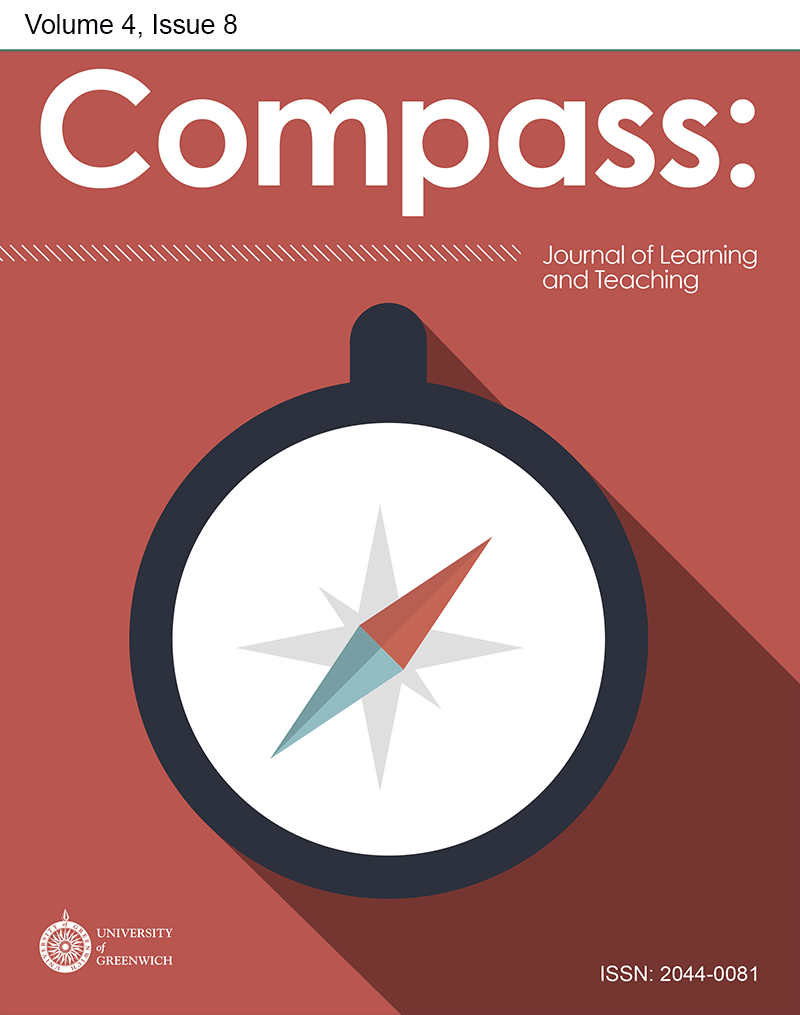'Shared listening': using a World cafe approach as a revision tool in a final year undergraduate programme
DOI:
https://doi.org/10.21100/compass.v4i8.78Keywords:
AssessmentAbstract
World Café was developed originally in the 1990s as a method to harvest collective knowledge through discussion, conversation and ‘shared listening’ (Brown, 2002). This case study considers its use as a revision tool for a final examination. ‘Circulating focus groups’ (Ritch & Brennen, 2010) revealed lack of background reading or full immersion in the topic by individuals; early saturation of topics and over-confidence or sketchy knowledge resulting in incomplete information. The process required close management by the ‘host’ (tutor) and was useful for students with dyslexia. Whilst it appears to be a liberating experience for students, there remains an argument about both the nature of University assessment and the need to support and prepare students for exams.
References
Barnes, C. (2003) What a difference a decade makes: reflections on doing ‘emancipatory’ disability research. Disability & Society, Vol.18, Issue 1, pp3-17.
Bowen, G.A. (2008) Naturalistic Enquiry and the saturation concept: a research note. Qualitative Research, Vol. 8, pp. 137-152.
Brown, J. (2002) The World Café, A Resource Guide for Hosting Conversations that Matter. Mill Valley, CA: Whole Systems Associates.
Brown, J. and Isaacs, D. (2004) What is a ‘World Café’? Future of Work Agenda. The Work Design Collaborative LLC.
Brown, J. and Isaacs, D. (2005) The World Café: Shaping our futures through conversations that matter. San Francisco: Berrett-Koehler.
Goodin, H.J. and Stein, D. (2008) Deliberative discussion as an innovative teaching strategy. Journal of Nursing Education, Vol. 47, No. 6 pp 272-4.
Owen, H. (1997) Open Space Technology: A User’s Guide. San Francisco: Berrett-Koehler.
Ritch, E.L. and Brennen, C. (2010) Using World Café and drama to explore older people’s experience of financial products and services. International Journal of Consumer Studies. Vol. 34, Issue 4, pp 405-411.
Schieffer,A., Isaacs, D. and Gyllenpalm, B. (2004) The World Café. World Business Academy, Transformation. Vol. 18, Issue 8.
Seel, R. (2006) Liquid Café. [Online]. Available at: http://www.new-paradigm.co.uk/liquid_cafe.htm. [Accessed 5th July 2013].
Downloads
Published
How to Cite
Issue
Section
License
Compass: Journal of Learning & Teaching provides immediate open access to its content on the principle that making research freely available to the public supports a more equitable global exchange of knowledge.
Works are released under the default licence of Creative Commons Attribution 4.0 International (CC BY), which provides unrestricted use, distribution, and reproduction in any medium, provided the original work is properly cited. If authors require a divergent licence, please contact the Scholarly Communications Manager at scholarlycommunications@greenwich.ac.uk.
Authors of articles published in Compass: Journal of Learning & Teaching remain the copyright holders to their published work and grant third parties the right to use, reproduce, and share the article according to terms of the Creative Commons license agreement applied to the work by Compass: Journal of Learning & Teaching.
Self-archiving policy: authors are permitted, and encouraged, to deposit any version of their article - submitted, accepted, and published versions - in subject and institutional repositories at any time.
If you have any queries about the choice of license, or which to discuss other options, please contact the Scholarly Communications Manager at scholarlycommunications@greenwich.ac.uk.



